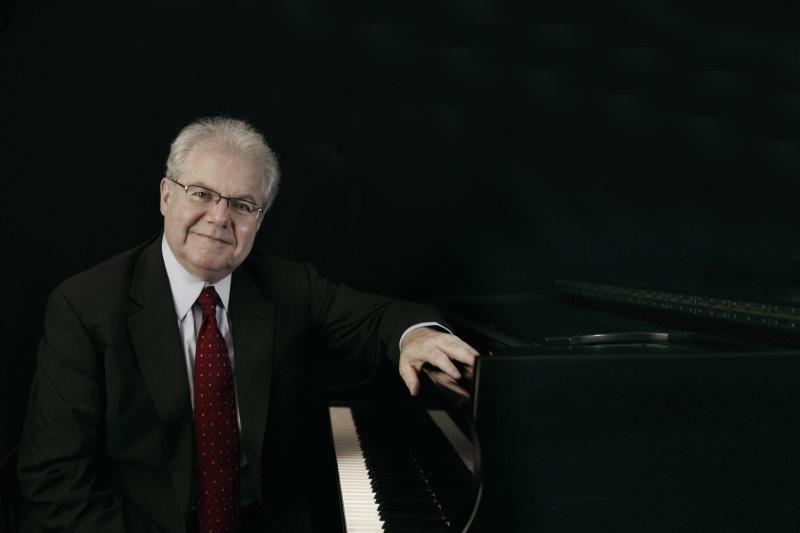Ax, Keenlyside, Dover Quartet, Wigmore Hall review – celebratory Schumann | reviews, news & interviews
Ax, Keenlyside, Dover Quartet, Wigmore Hall review – celebratory Schumann
Ax, Keenlyside, Dover Quartet, Wigmore Hall review – celebratory Schumann
The great pianist marks his 70th with a congenial if unassuming programme

Emanuel Ax here celebrated his 70th birthday with an all-Schumann recital. In fact, it was an all-Schumann marathon, a three-hour concert at Wigmore Hall featuring solo works, Dichterliebe with Simon Keenlyside, and, with the Dover Quartet, the Piano Quartet and the Piano Quintet.
The Arabeske, op. 18, began the concert, and demonstrated the pianist’s natural ease with the composer. Ax remains nimble and has an elegantly light touch. He revels in the brief snatches of melody that often blossom in the upper reaches of the piano, but he is just has happy intoning the smooth, rounded harmonies that form the basis of most of Schumann’s piano textures. Phrases were generously shaped, and cadences lingered, but there was never any sense that Ax was trying to make a point: These were personal and inward-looking accounts. The Fantasiestücke, op. 12, that opened the second part (of three) went further still. There was drama here, and plenty of colours and moods, but Ax seemed to be playing to himself, the results all the more singular and poignant for the pianist simply following his muse.
 Keenlyside’s Dichterliebe was a more torrid affair. The singer (pictured right, by Robert Workman) is never less than passionate, and delivered Heine’s pained texts with a rare intensity. His voice is maturing elegantly, losing some purity of tone, and evenness across the registers, but gaining character and burnish, ideal for Schumann’s lingering lines. Ax seemed reluctant to follow Keenlyside to his emotional extremes, choosing instead to contribute elegance and finesse to all those middle-register piano sonorities. But he couldn’t help be drawn in, following Keenlyside’s lead in gradually raising the emotional intensity. Even so, his most satisfying contribution was the work’s meditative coda, another reflective moment from which he could draw so much from the piano’s subdued textures.
Keenlyside’s Dichterliebe was a more torrid affair. The singer (pictured right, by Robert Workman) is never less than passionate, and delivered Heine’s pained texts with a rare intensity. His voice is maturing elegantly, losing some purity of tone, and evenness across the registers, but gaining character and burnish, ideal for Schumann’s lingering lines. Ax seemed reluctant to follow Keenlyside to his emotional extremes, choosing instead to contribute elegance and finesse to all those middle-register piano sonorities. But he couldn’t help be drawn in, following Keenlyside’s lead in gradually raising the emotional intensity. Even so, his most satisfying contribution was the work’s meditative coda, another reflective moment from which he could draw so much from the piano’s subdued textures.
The Dover Quartet is a young ensemble, but the players found as easy affinity with Ax’s autumnal Schumann. In the Piano Quartet, the pianist is integrated into the string ensemble, while in the Quintet it is more independent. But the interpretations of both works seemed to flow from Ax’s lyrical and energetic, but always unassuming, approach. The results were subdued, with only occasional dramatic outbursts, and even the Finale of the Quintet felt relaxed and unhurried. Ax rarely seemed to increase his dynamics to match the quartet, but the transparency of their textures always allowed him to shine through. For such an imposing work, this was a surprisingly lyrical and breezy account, highly lyrical, celebratory and, above all, fun. Happy birthday Emanuel Ax!
rating
Share this article
The future of Arts Journalism
You can stop theartsdesk.com closing!
We urgently need financing to survive. Our fundraising drive has thus far raised £49,000 but we need to reach £100,000 or we will be forced to close. Please contribute here: https://gofund.me/c3f6033d
And if you can forward this information to anyone who might assist, we’d be grateful.

Subscribe to theartsdesk.com
Thank you for continuing to read our work on theartsdesk.com. For unlimited access to every article in its entirety, including our archive of more than 15,000 pieces, we're asking for £5 per month or £40 per year. We feel it's a very good deal, and hope you do too.
To take a subscription now simply click here.
And if you're looking for that extra gift for a friend or family member, why not treat them to a theartsdesk.com gift subscription?
more Classical music
 Jakub Hrůša and Friends in Concert, Royal Opera review - fleshcreep in two uneven halves
Bartók kept short, and a sprawling Dvořák choral ballad done as well as it could be
Jakub Hrůša and Friends in Concert, Royal Opera review - fleshcreep in two uneven halves
Bartók kept short, and a sprawling Dvořák choral ballad done as well as it could be
 Monteverdi Choir, ORR, Heras-Casado, St Martin-in-the-Fields review - flames of joy and sorrow
First-rate soloists, choir and orchestra unite in a blazing Mozart Requiem
Monteverdi Choir, ORR, Heras-Casado, St Martin-in-the-Fields review - flames of joy and sorrow
First-rate soloists, choir and orchestra unite in a blazing Mozart Requiem
 Cho, LSO, Pappano, Barbican review - finely-focused stormy weather
Chameleonic Seong-Jin Cho is a match for the fine-tuning of the LSO’s Chief Conductor
Cho, LSO, Pappano, Barbican review - finely-focused stormy weather
Chameleonic Seong-Jin Cho is a match for the fine-tuning of the LSO’s Chief Conductor
 Classical CDs: Shrouds, silhouettes and superstition
Cello concertos, choral collections and a stunning tribute to a contemporary giant
Classical CDs: Shrouds, silhouettes and superstition
Cello concertos, choral collections and a stunning tribute to a contemporary giant
 Appl, Levickis, Wigmore Hall review - fun to the fore in cabaret and show songs
A relaxed evening of light-hearted fare, with the accordion offering unusual colours
Appl, Levickis, Wigmore Hall review - fun to the fore in cabaret and show songs
A relaxed evening of light-hearted fare, with the accordion offering unusual colours
 Lammermuir Festival 2025, Part 2 review - from the soaringly sublime to the zoologically ridiculous
Bigger than ever, and the quality remains astonishingly high
Lammermuir Festival 2025, Part 2 review - from the soaringly sublime to the zoologically ridiculous
Bigger than ever, and the quality remains astonishingly high
 BBC Proms: Ehnes, Sinfonia of London, Wilson review - aspects of love
Sensuous Ravel, and bittersweet Bernstein, on an amorous evening
BBC Proms: Ehnes, Sinfonia of London, Wilson review - aspects of love
Sensuous Ravel, and bittersweet Bernstein, on an amorous evening
 Presteigne Festival 2025 review - new music is centre stage in the Welsh Marches
Music by 30 living composers, with Eleanor Alberga topping the bill
Presteigne Festival 2025 review - new music is centre stage in the Welsh Marches
Music by 30 living composers, with Eleanor Alberga topping the bill
 Lammermuir Festival 2025 review - music with soul from the heart of East Lothian
Baroque splendour, and chamber-ensemble drama, amid history-haunted lands
Lammermuir Festival 2025 review - music with soul from the heart of East Lothian
Baroque splendour, and chamber-ensemble drama, amid history-haunted lands
 BBC Proms: Steinbacher, RPO, Petrenko / Sternath, BBCSO, Oramo review - double-bill mixed bag
Young pianist shines in Grieg but Bliss’s portentous cantata disappoints
BBC Proms: Steinbacher, RPO, Petrenko / Sternath, BBCSO, Oramo review - double-bill mixed bag
Young pianist shines in Grieg but Bliss’s portentous cantata disappoints
 theartsdesk at the Lahti Sibelius Festival - early epics by the Finnish master in context
Finnish heroes meet their Austro-German counterparts in breathtaking interpretations
theartsdesk at the Lahti Sibelius Festival - early epics by the Finnish master in context
Finnish heroes meet their Austro-German counterparts in breathtaking interpretations
 Classical CDs: Sleigh rides, pancakes and cigars
Two big boxes, plus new music for brass and a pair of clarinet concertos
Classical CDs: Sleigh rides, pancakes and cigars
Two big boxes, plus new music for brass and a pair of clarinet concertos
